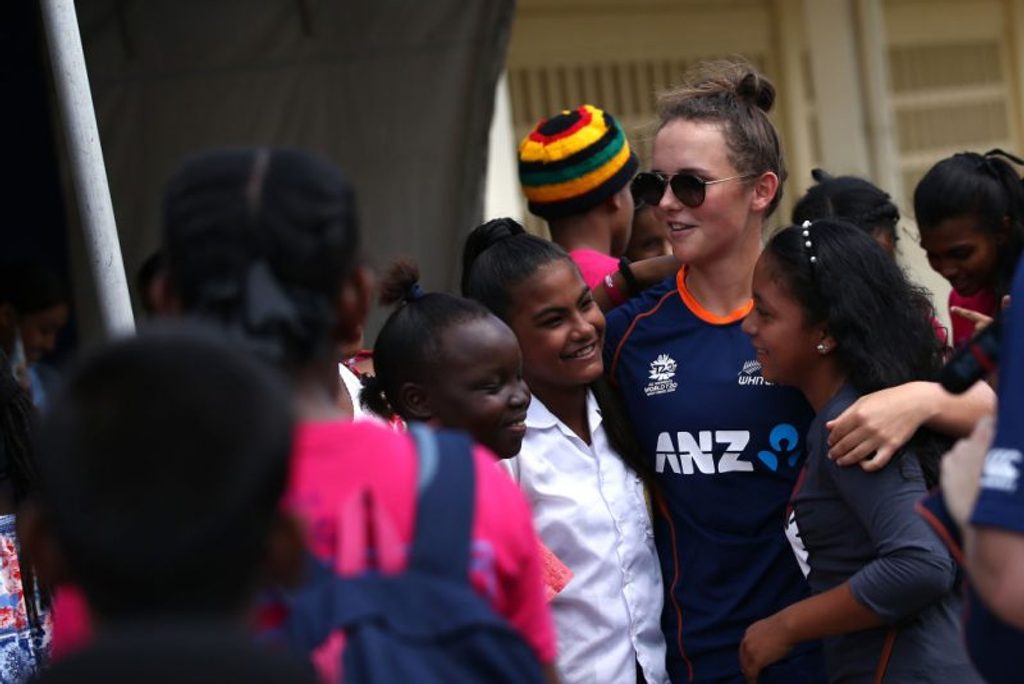
Earlier this year, Katie Perkins applied for leave from her day job as a police office to turn out for New Zealand Women in their series against India and Australia. Katey Martin, the wicketkeeper-batter, meanwhile, ended up missing the T20I leg of the India tour because she was kept busy by her work at an IT company.
But, there could soon be fewer examples of premier female cricketers in New Zealand having to balance their cricket with their careers or studies outside the sport, as New Zealand Cricket takes another step towards professionalism.
On Tuesday, August 13, New Zealand Cricket announced a new Women’s Master Agreement that will give its national players a pay hike, while also expanding the pool of contracted players and, most significantly, handing out domestic contracts.
Visual Highlights of the Women’s Master Agreement.https://t.co/qKNsCtfWvp pic.twitter.com/2XoE74Xxi4
— NZCPA (@NZCPA) August 13, 2019
The agreement, which replaces an existing MoU that ran till July 31, sees the total player payment pool increase to NZ$ 4.136 million in three years from the previous NZ$ 1.575 million. As against the 15 contracted players last time, there will now be 17 centrally contracted players, eight players on developmental contracts and 59 players on domestic contracts.
[breakout id=”0″][/breakout]
According to figures released by NZC, the centrally contracted White Ferns will earn between NZ$ 40,000 and NZ$ 64,000 annually (including the retainer payment and retirement fund contributions, up from NZ$ 21,000 to NZ$ 35,000 last year), and up to NZ$ 16,000 in match-fees. They can also continue to supplement their income by playing in overseas leagues.
While the development players will earn NZ$ 7,500 a year, nine players from each of the six major domestic associations will earn NZ$ 3,250 for their participation in domestic tournaments.
Importantly, it also enables our best players to continue to ply their trade in T20 competitions around the world whilst remaining committed to representing the White Ferns. https://t.co/71LwOmusvk
— Heath Mills (@heathmmills) August 13, 2019
Earlier this year, the issue of pay disparity in the domestic set-up was brought into sharp view when Peter McGlashan, the former player and commentator, pointed out that the women got only a meal allowance for participating in the Super Smash final, even as the men’s winners stood to take home $NZ 80,000.
Hailing the support for the domestic cricketers as “an important step forward”, Amy Satterthwaite, the captain, said in a statement, “This is an agreement that recognises the need to grow the game at grassroots and domestic level in order to produce White Ferns who excel on the world stage.”
Suzie Bates, the former captain, added, “From what I can see, it provides a great framework and starting point for the eventual semi-professionalisation of the women’s domestic game in New Zealand – and that’s probably the most important point in the entire agreement.”
[caption id=”attachment_117485″ align=”alignnone” width=”800″] The incentive is expected to give a boost to the next generation of players in New Zealand[/caption]
The incentive is expected to give a boost to the next generation of players in New Zealand[/caption]
While New Zealand have been at the forefront of women’s cricket through the years, they have slipped up in recent years, struggling to match up to the rapid pace of development in countries such as Australia, and to an extent even England and India. Their lack of depth was exposed in the last two world tournaments, where they failed to make it past the group stage. The former World Cup winners are sixth on the ICC Women’s Championship, behind India and Pakistan.
Speaking after a disappointing World T20 campaign in the West Indies in late 2018, Satterthwaite had bemoaned the team’s bench strength. “You’ve seen the likes of Australia and England with the competitions that they’ve brought in, that have started to probably grow their depths even more and we’ve got to keep addressing it in our country.”
https://twitter.com/SuzieWBates/status/1161219992270135296
Stressing on the importance of contracts, Martin had added at the time, “It would be good to get to a point where cricket is [the] primary focus … The more time you spend doing something the better you are going to get at it.”
The new system appears to be a step towards addressing that imbalance, with the financial security that comes from a contract allowing players more time and resources to work on their skills and, importantly, fitness.
“With the ICC Women’s World Cup 2021 on the horizon, this will mean a great deal in terms of upskilling and training, and providing the best possible environment for preparing ourselves and the team,” said Satterthwaite.








